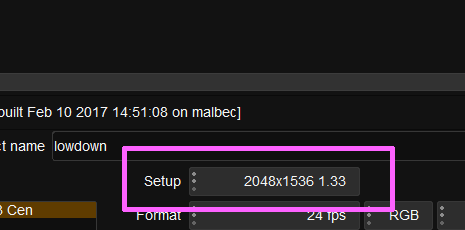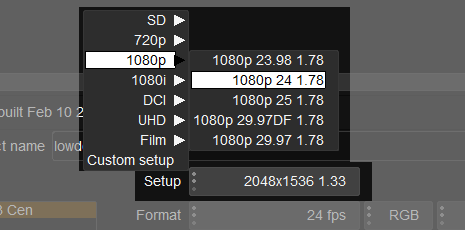UM:Appendix Output Format Configuration
Every project a main output format defined and may also have one or more secondary formats configured. Available formats appear as a drop-down list on the project screen with a name Setup.
|
The Output Format Selector drop-down list. |
Interacting with the Output Format Selector drop-down list and choosing a format. |
The output formats available can be defined through the use of text configuration files.
Configuration Files
The default configuration file exists in the application C:\Nucoda\VERSION\root.
If a user configuration file exists in the same folder it will override the defaults. This user configuration file does not exists unless you create it.
Default Configuration File
Name : |
defaultOutputFormats.prefs |
Location : |
C:\Nucoda\VERSION\root |
This is the main configuration file for the drop-down list and defines the standard output formats available.
You should not edit or modify this file. It will be over-written by every application install. If you want to modify the format list, edit the userOutputFormats.prefs file. |
User Configuration File
Name : |
userOutputFormats.prefs |
Location : |
C:\Nucoda\VERSION\root |
This file does not exist by default.
If it exists, it will over-ride the default settings in the defaultOutputFormats.prefs file.
Configuration File Format
A high-level overview of the file format is shown below :
outputFormats
[
// Multiple formats allowed
FORMATNAME // Must be unique
{
name "<Format Name>" // as displayed
size N N // X Y pixels
aspect W H // Rational aspect
fps N N // Rational FPS
fieldOrder <FIELD ORDER> // See below
dropFrame <Boolean>
initial <Boolean> // Optional - see below
}
FORMATNAME2 // Must be unique
{
name "<Format Name>" // as displayed
size N N // X Y pixels
aspect W H // Rational aspect
fps N N // Rational FPS
fieldOrder <FIELD ORDER> // See below
dropFrame <Boolean>
initial <Boolean> // Optional - see below
}
insertDefault <Boolean> // insert default list?
]
Definitions
Some configuration file parameters are of a specific type :
Rational : |
A Rational number is a fraction and is composed of a numerator (top) and a denominator (bottom).
Rather than using a floating point number (and decimal places), a rational number can more accurate reflect a parameter such as aspect ratio, or frames per second. |
Boolean : |
A Boolean value is either true or false. |
Sections
FORMATNAME
Type : Identifier
Each output format definition is grouped (using curly braces), and named. These names :
| • | Must be unique |
| • | Must not contain spaces (Only : a-z,A-Z,0-9,_,-) |
These names are not related to the user visible name field used inside the format definition and can be different. |
Example :
Main_Feature_2800x1800_Test {
} |
name S
Type : String
This is the user visible display name for the format. It is a string wrapped in double-quotes ("") and can contain spaces.
Example :
name "2800 x 1800 Test" |
size W H
Type : Rational
The size parameter specifies the pixel width and height as a rational number.
Example :
size 2800 1800 |
aspect N M
Type : Rational
The aspect parameter specifies the aspect ratio as a rational number (fraction with a numerator and a denominator).
Example :
aspect 37 20 // 1.85 |
fps N M
Type : Rational
The fps parameter specifies the frames per second as a rational number.
Example :
fps 2997 100 // i.e. "29.97" |
fieldOrder S
Type : String
The fieldOrder parameter specifies how to interpret a frame in the format. It is a string wrapped in double-quotes ("") and can take values :
InterlacedUpper |
Format uses interlaced frames (fields) with upper field dominant. |
InterlacedLower |
Format uses interlaced frames (fields) with lower field dominant. |
Progressive |
Format is not fielld based. |
Example :
fieldOrder "Progressive" |
dropFrame B
Type : Boolean
The dropFrame parameter specifies if the format uses drop-frame timecode (true) or not (false).
Example :
dropFrame false |
initial B
Type : Boolean
This parameter is optional.
The initial parameter specifies that the format it appears in will be selected on application start (for a completely fresh installation).
Example :
initial true |
insertDefault B
Type : Boolean
The insertDefault parameter can be used in a user configuration file (userOutputFormats.prefs) to load in the default output formats (a specified in the defaultOutputFormats.prefs file) at the location the directive appears.
Example :
insertDefault true |

